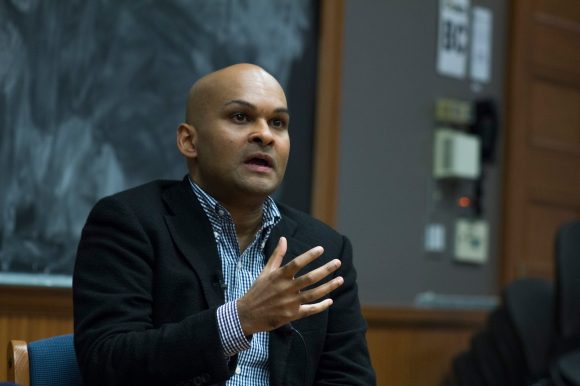
Reihan Salam speaks during his conversation hosted by the Center for Western Civilization, Thought and Policy held in Hale Science on Oct. 26, 2017. (Bri Barnum/CU Independent)
Executive editor of the conservative news outlet National Review and Slate columnist Reihan Salam was interviewed by Professor Benjamin Teitelbaum on Thursday. The Center for Western Civilization, Thought and Policy organized the conversation on immigration, nationalism and the impact of multicultural politics.
“He is the type of figure one forms assumptions about at their own peril,” Teitelbaum said before the interview. “His perspectives are equally unconventional as they are intelligent and provocative.”
Salam first came into the public eye in 2008 through co-authoring the book Grand New Party: How Republicans Can Win the Working Class and Save the American Dream. Born to Bengali immigrant parents in Brooklyn, Salam’s background appears unusual for someone with cautious views on immigration and shared kinship with culturally-oriented American nationalists.
His views are not as extreme as those espoused in certain wings of the Republican party. He has expressed discomfort with the president’s rhetoric. However, some of Salam’s ideas, at least regarding immigration and national identity, are aligned with Trump administration policy initiatives.
Although he never expressed any issue with multiculturalism existing in some capacity, Salam feels that large-scale immigration to the U.S. has complicated the social bargain. The large influx of immigrants over the past 30 years, he argued, has driven a wedge between younger and older Americans who see little of themselves in each other.
“In every society, there’s often times this sense that, well, wait a second, this younger generation, those are my children, my grandchildren,” Salam said. “We are bound together … That’s a big thing that makes people believe it’s appropriate to make sacrifices.”
Salam credited a low birthrate and a fair amount of immigration to creating a generational divide in the U.S. This divide, he explained, plays a crucial role in how people perceive a host of issues.
“When you feel as though younger generations are radically different to your own, you don’t have to be a terrible or deeply ungenerous person to feel a sense of alienation from the way your country is changing,” Salam said.
Another key element of Salam’s argument about immigration is that if native-born Americans with limited skills and education have trouble making it here, there is little reason to believe low-skilled immigrants will be any more successful. Salam sees the fact that two-thirds of green cards are awarded to relatives of people already in America as problematic.
He feels strongly that those who have the highest chance of succeeding in America, those with advanced skills and a proficiency in English, should be prioritized as they will add the most to society and require the least amount of assistance.
Citing a recent quote from former President Bill Clinton, Salam said that almost everyone, despite the negative connotations the term has recently taken on in some circles, is a nationalist. The difference, however, lies in the distinction between tribal and ideological nationalism. Tribal nationalism is based on shared heritage. Ideological nationalism is based on a shared commitment to a set of values.
Salam argued that there is a need for true kinship between all Americans. If there is a perception that some group, in this case immigrants, is not fully invested in America’s collective social bargain, the social fabric will begin to deteriorate as people cling to their own tribal groups and subcultures rather than to a broader sense of Americanism.
In regards to policy, Salam adheres to the idea that limiting immigration in the short-term would give the U.S. time to recover and reform this broader sense of kinship as it did after past societal shifts.
Contact CU Independent Staff Writer Noah Zucker at noah.zucker@colorado.edu.
